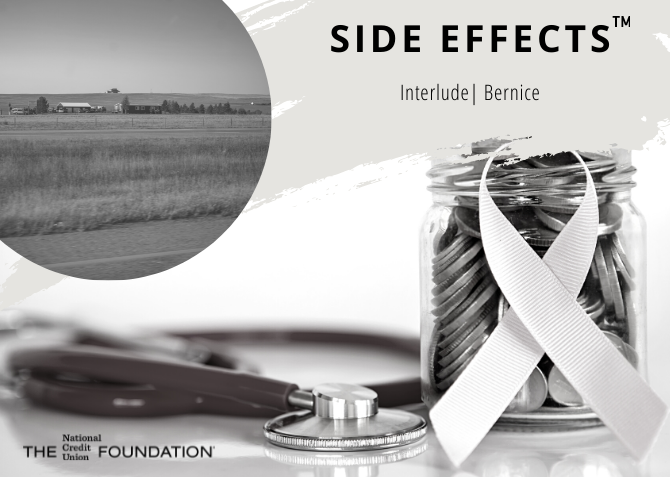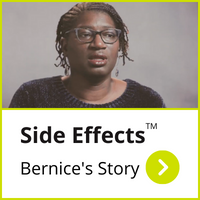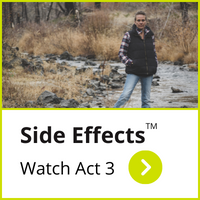Side Effects™, Interlude: Bernice

My name is Bernice Anthony. I am 46, and I’m an HR professional for a Fortune 500 company. I’m an investigator.
How did you find out you had cancer?
 I have been diagnosed with breast cancer, specifically twice now. the first item was back in 2009. I didn’t get to my fifth-year anniversary, I was diagnosed again in 2012 or 2013, I’m a little fuzzy on the year of that second diagnosis.
I have been diagnosed with breast cancer, specifically twice now. the first item was back in 2009. I didn’t get to my fifth-year anniversary, I was diagnosed again in 2012 or 2013, I’m a little fuzzy on the year of that second diagnosis.
Both times, they were estrogen receptor positive breast cancer, which means the cancer feeds off of estrogen, and I have a lot of that (chuckles). It was also both times HER-2 positive, which meant that my cancer grew fast. So we had to be a bit aggressive with the treatment.
In 2009, I’d been pretty adamant about doing my breast self-exams. In both times, I actually found it myself. In 2009, it was like any other day. I was getting the kids up and getting ready. I had just taken my shower and was doing my exam and lo and behold, was like “hey, what is this?” And so I went in and talked to my doctor. I was young. I did not expect the cancer diagnosis at that age. That was the first time.
On the second time, I didn’t quite make it to my five-year anniversary. I really thought I would. The second time, I wasn’t feeling well. I was really tired, and no matter how much sleep, I was feeling so fatigued. I was having some pain on the same side but I just thought it was like “Bernice, you need to get your butt up and just exercise. Maybe you’re tired because you don’t do enough.” But I said to myself, “You’ve been through this before, so go talk to the doctor.”
I contacted my oncologist and he gave me the news. Exact same diagnosis as last time. PR positive, HER-2 positive. And we had to take some more aggressive precautions and actions.
How has your treatment been going?
 The first time I was diagnosed, I elected to do breast preservation surgery, so we did a lumpectomy. I also did chemotherapy and immunotherapy and radiation…and whoa, radiation was difficult. It was hard. That was the first time.
The first time I was diagnosed, I elected to do breast preservation surgery, so we did a lumpectomy. I also did chemotherapy and immunotherapy and radiation…and whoa, radiation was difficult. It was hard. That was the first time.
The second time, I had to get a complete mastectomy with reconstructive surgery because it was on the same side. I’d already had two kids, so I also elected to have a hysterectomy. I had to have an oophorectomy anyway (removal of ovaries), so I decided to get rid of everything. There’s a history of ovarian cancer in my family anyway, and I didn’t want to chance that.
I’m still on the hormonal therapy, which will last 10 years.
How did cancer affect you financially?
I moved to Indiana almost 21 years ago. Didn’t know anybody. The only people I had with me was my husband and my two kids. I was fortunate to have a good network of friends that I’d met through work. I’m also fortunate to work for a company that offers great benefits. I would say that was a major blessing.
But I was off work for a year the first time. And the second time, it was about nine months. I’ll tell you, the first time, when you have benefits and short-term disability and long-term disability. What no one really talks about, though, is that short-term disability ends when you receive 100% of your pay…and then your benefits decrease. If you’re like us, when we were managing our budget, according to both of our incomes for the first time, it was really difficult.
I’ll also say that between the first and second times I had cancer – and not a lot of people know this, but you can do a public search – we did have to file bankruptcy. We had a trustee who worked really close with us, and we were able to try to get our payments…we were just on the cusp; we made too much for the one where they discharge everything, so we did the one where we still had payments to make.
You get accustomed to a certain way of life, and then things change. You have, despite having medical insurance – and I would venture to say that it was good medical insurance – we still had a co-pay. We still had that money that we have to pay on top of your other bills. Yes, you can get on payment plans but it felt like you would never get your head above the water with paying the bills.
I did work very closely with my oncologists and their office manager to see how I could get certain drugs covered. I worked tirelessly. I had a notebook and every time I spoke to the insurance company – because there was one particular type of drug that they did not want to pay for, and it was very key for my HER-2 positive treatment – and even from the standpoint of the second diagnosis, getting approval to do the genetic testing, because this was the second time I’d been diagnosed, and they didn’t want to pay for it. And you still have to pay for some things in order for you to actually get it, and then hoping you’ll get reimbursed. It can be tough.
Adding up all of the out-of-pocket costs of her treatment: Oh my God…this is when I wish I had my trusty Excel spreadsheet to keep track of the cost of all this. Being the planner that I am, with my benefits, I tried to do an HSA, and nothing could’ve prepared me for this, and I didn’t have enough in my Flexible Spending Account for all the charges.
Probably the first time, oh my goodness, the out-of-pocket expenses were about $15,000…and that’s because I had great insurance. My second time around, because of complications – I had way more complications – I would guess that we had to pay $10,000 – $15,000 out of pocket. We went through bankruptcy.
How did your cancer affect you emotionally?
The first time I was diagnosed, I just couldn’t believe it because I was so young. At that point, there was no one in my family who had been diagnosed with breast cancer, so I’m thinking there must be some type of external reason. It can’t just be me. There must be something in the air or the water or something (laughs).
It was tough. I couldn’t talk about it without crying because I didn’t know anyone who had had it before. I didn’t know what you would do. All I knew was that the doctor said, “I need to talk to you today, after hours” and I was like “holy crap, this must be really bad.” Then getting all these papers and feeling overwhelmed.
By nature, I’m a very curious individual, and I think that comes from my educational background and wanting to know ‘why’, wanting to know all the details. I overwhelmed myself with knowledge. That can make you depressed, even if you’re thinking that you need to know this information, you want to know, you have to know.
I do remember in one of the doctor’s appointments how I’m sitting there with my notepad and going through my questions with the doctor, and my doctor is like, “Put the notepad down. I just want you to hear me. Let’s talk about this.”
I think the second time that I was diagnosed, because I had gone through it before, but this time since I had to get an oophorectomy, which I knew would take away my ovaries, I knew what that meant. I thought I’d be ok with getting the hysterectomy and getting the reconstructive surgery, but I had complications and even had emergency surgery.
I wasn’t feeling too good about myself.
I think just personally, I know that having breasts isn’t the equivalent of being a woman. I know that having a uterus isn’t the equivalent of being a woman. But when I was looking at myself, sometimes I cried. I felt…I don’t really know what words to say to describe it. Even right now, I get teary-eyed. It’s still something that I struggle with, from a self-image standpoint. I did get reconstruction but it’s still not…it’s still not what I would’ve wanted for myself, from a womanhood standpoint.
But I know what it is. I’ve been depressed somewhat. I’ve never been diagnosed with it, but one of the things that I do talk to my oncologists about and we’re able to manage some of the medicine that can treat some of that, while also simultaneously treating the breast cancer. That’s been helpful. Sometimes I get upset because I’m 46 years old and I shouldn’t be going through this. Sometimes I feel like I’m older than what I am because of some of the personal issues that I have to deal with, with being a woman.
It’s still really close, even though it’s been a while. I don’t know if part of it is because I’m still on medication or a six-month rotation with seeing my oncologist and breast surgeon. Even though I’m far out from the diagnosis, I’m still nervous about it coming back.
Did you ask your financial institution for assistance?
I remember talking to my credit cards at that time. I also contacted my mortgage company at that time as well. I’m trying to remember that they’re some programs that were going on. I consider myself pretty educated, but going online…it was like: pick this program if you want this option, etc. There was no option to pick if I was getting cancer treatment and you need our assistance.
I was embarrassed at first because we had to file for bankruptcy. Understanding there was, thinking about the future. We were able to get some things modified in our bankruptcy, which was very helpful.
Why didn’t you contact your bank or credit union?
I didn’t know that you could call.
I’m gonna use specifically my mortgage and my vehicle. My husband and I both have cars. We have two kids that we gotta get to daycare or the school, then get to our jobs. My husband’s job is 45 minutes away. I don’t recall thinking that, even from a mortgage standpoint, you could tell your mortgage company, “Hey, I’m sick and I’m not working; can you stop or reduce my payments?” I don’t recall that in growing up, in getting educated about the home buying process.
Nowadays, I see them talk about forbearance or deferment in my statements, but I don’t recall them talking about how to do that. From a car standpoint, I’ve always thought that, if you didn’t pay your car note, they repossess your car. If you’re not paying your car note, they don’t care if you’re sick.
At the same time that I was diagnosed, my company was going through some restructuring and we all had to compete for our jobs…again. I was trying to be optimistic and say, “what’s the worst that can happen?” Well, the worst is that my husband and I and our two kids could end up on the street. I had to think about what I could do to prevent that from happening. I did what I had to do.
What do you wish financial institutions would do to help cancer patients and their families?
One – listen. If I were to call you and I’m telling you the situation, I’d like for you to help me understand what options are available, and not just tell me that I’m responsible for the payments or I should have more money in my savings to cover me during this time; that I should’ve pre-planned.
No one pre-plans for cancer.
Treat it like any other chronic illness. That’s what it is. Give us options. Don’t make us jump through the hoops for it. And be ok with the documentation that doctors are providing you. You make us jump through hoops and share all this information. It’s enough that we’re going through this disease, without having to share all of this personal information with you, just so try to defer your help to us in some kind of way.
Watch Bernice’s story here.
